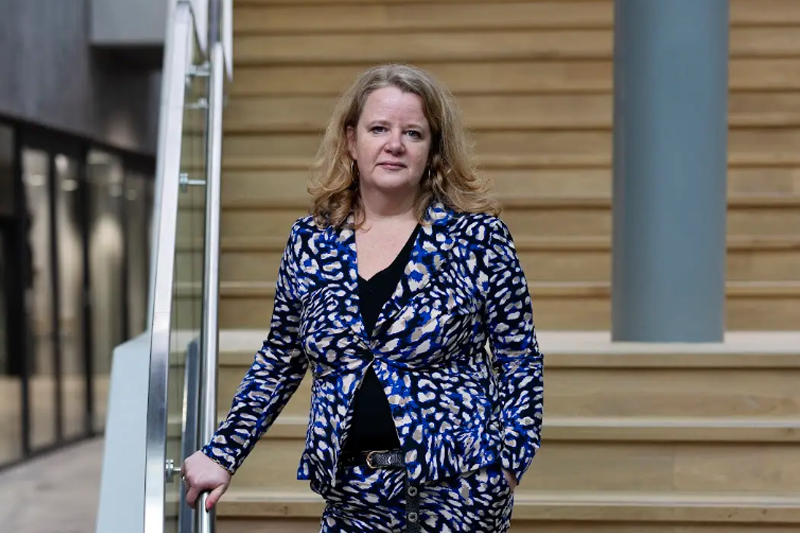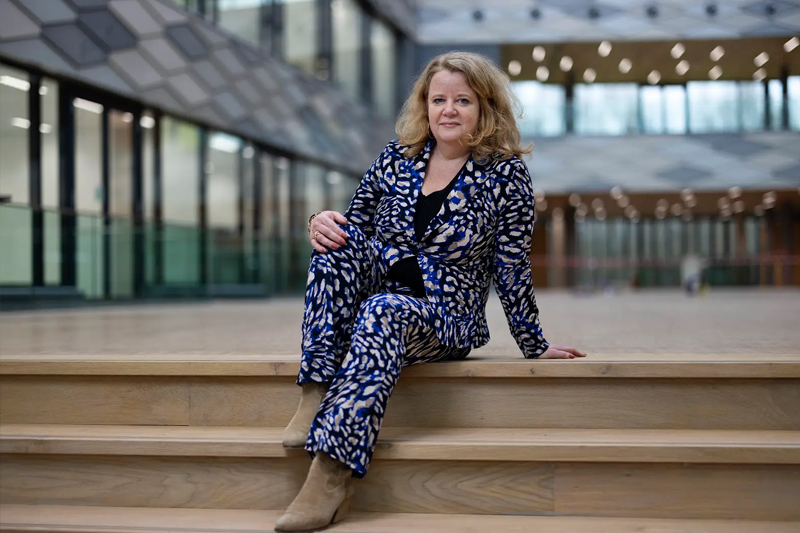Interview Moniek Tromp: If you have ambitions to be an entrepreneur: definitely do it!
01 April 2025

She comes from an entrepreneurial family. Sometimes she dreams about launching that battery factory that the Dutch energy supply chain could so well use. Moniek Tromp, Professor of Materials Chemistry in Groningen, is pleased with initiatives that encourage entrepreneurship in academia: ‘Earmarked money to stimulate valorization, such as at the Faculty of Impact, can make just the difference in bringing research to the market.’
Her father once started a plumbing business in his parents’ garage that grew into a large installation company in the Veluwe. Her brother took over and focused the company entirely on sustainable techniques. So there is no shortage of entrepreneurial blood in the Tromp family. Moniek herself became a leading scientist in the complex field of energy transition and, more specifically, battery innovation. But who knows: if thirty years from now a factory for large-scale battery production comes to (the north of) the Netherlands, currently still a missing link, she might just have a hand in it.
Most people here are trained in research. Writing a business plan or talking to investors is a whole other ballgame. You need help with that.
Major boost
With her own research group, she is working on the battery of the future, which will last longer and consist of more sustainable materials. As ‘captain of science’ of the chemistry top sector and the battery figurehead of the Netherlands, she initiates research into battery technology and tries to promote cooperation between science, government and industry. Thanks to a substantial investment from the National Growth Fund for the Material Independence & Circular Batteries program, developments in the Netherlands received a major boost. This can also be seen in startups knocking on her door to have new technology tested and large companies increasingly showing interest in setting up or collaborating. So a big, well-needed catch-up is taking place. ‘In Asia they have been investing heavily for years in a working ecosystem, with the important added advantage that production and scaling up are much cheaper and require less paperwork than in Europe.’
Does research also lead to new business? Or do many academic inventions remain on the shelf?
‘That varies a lot per discipline. When I look at the materials field, I see an enormous number of innovations, but they are certainly not just lying there on the shelves in waiting for the moment that someone picks it up in order to bring it to the market. A lot of fundamental research comes from pure interest and curiosity, from exciting ideas. Something made in the lab on a small scale can be very promising, but it becomes much more complicated if you want to take it further on a large scale. At that early stage, it is not always helpful to think right away about whether and where your materials are available in sufficient quantities. Or whether you can dig them up in a clean and sustainable way. Much research is still needed to arrive at truly sustainable processes. This does not immediately lead to products that can be put on the market just like that.’
There is no shortage of innovative ideas, but the question always is: how do you build something from that, which will still exist after a few years and with which you will make a difference in this large international playing field?

Do you see many researchers with entrepreneurial ambitions?
‘There certainly are, also in my own field. Also, there is no shortage of innovative ideas, but the question always is: how do you build something from that, which will still exist after a few years and with which you will make a difference in this large international playing field? Because what I also see is that students are increasingly looking for ways to be truly meaningful. They see what’s going on in the world and feel the need to contribute something, without initially worrying about a high salary. But the step to starting their own business is a big one. Most people here are trained in research, know a lot about chemistry or physics, but writing a business plan or talking to investors is a whole other ballgame. You need help with that.’
We need to take it up more collectively, strengthen each other instead of duplicating things.
Do you think support is sufficiently available?
‘It is improving all the time; I do see progress in that area. Here in Groningen, for example, despite all the cutbacks, we have made available some budget for PhD students who can stay an extra year to write a business plan. That might be partly similar to what the Faculty of Impact is doing, but within our own faculty, in order to boost valorization. Personally, I think it would be good to look at the proper connections: who do we help internally and when do we put someone up for Faculty of Impact? But the important thing is that these kinds of initiatives, including the associated budget, are badly needed. Otherwise you won’t get it off the ground.’
But the important thing is that these kinds of initiatives, including the associated budget, are badly needed. Otherwise you won’t get it off the ground.
What could we do better?
‘Less fragmentation. I notice myself how difficult it is to help my students advance properly. It’s a rather confusing jungle of possibilities and initiatives: where do you get your money, what do you need, who can help you? There is so much more to it than just that invention in the lab. Within one university alone, there are all kinds of initiatives and working groups working on it. And then you have competing regions and partially overlapping national programs. We need to take it up more collectively, strengthen each other instead of duplicating things.’
What would be your advice for PhD students or other academics who want to be entrepreneurs?
‘Definitely do it! Seize the opportunities out there; I would certainly have considered such a fellowship myself. So I’m happy to help them along, if only by answering the important questions together: what to do, in what order, what to read up on, how to go about writing a business plan, what help do you need and where to find it? If this is where your ambitions lie, I can only encourage it.’